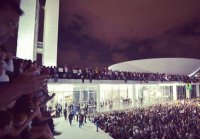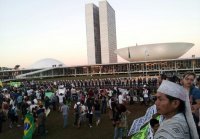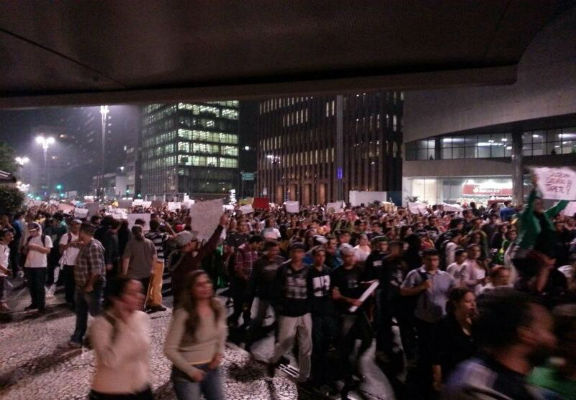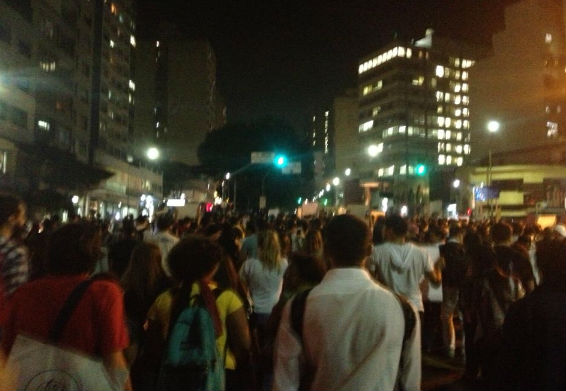www.aljazeerah.info
News, June 2013
Archives
Mission & Name
Conflict Terminology
Editorials
Gaza Holocaust
Gulf War
Isdood
Islam
News
News Photos
Opinion Editorials
US Foreign Policy (Dr. El-Najjar's Articles)
www.aljazeerah.info
|
Editorial Note: The following news reports are summaries from original sources. They may also include corrections of Arabic names and political terminology. Comments are in parentheses. |
One Million Brazilians Protest Huge Spending on Sports While Majority of People Suffer from Poverty and Corruption of Officials
 |
 |
 |
 |
 |
 |
Over one million march in Brazil as protests spread
Brazil saw its biggest day of protests yet on Thursday, despite a reversal in the bus fare increases that sparked the wave of unrest. As many as one million people took to the streets as President Dilma Rousseff called an emergency cabinet meeting.
By FRANCE 24 (text), June 21, 2013
Protesters in Brazil grew to 1 million on Thursday, with rallies and marches staged in over 100 cities across South America’s largest country, according to police and media. President Dilma Rousseff cancelled a scheduled trip to Japan and convened an emergency meeting to deal with the crisis.
While many of the huge demonstrations were peaceful, protests in Rio de Janeiro, Brasilia, Fortaleza and elsewhere ended with clashes between riot police and some groups.
The large-scale protests also saw its first victim on Thursday, as a motorist in the city of Ribeirão Preto in the state of Sao Paulo ran over as many as 13 people, killing an 18-year-old youth and seriously injuring three others, local media reported.
Around 300,000 people filled the streets of Rio de Janeiro, even after state officials said they would reverse an increase in bus fares. Proposed rises in transport costs have been abandoned across the country after the move sparked protests nationwide five days ago.
Rubber bullets
While many protesters called for a peaceful show of strength in Rio, the gathering descended into violence as night fell, with dozens of people injured as youth concealing their faces with t-shirts threw rocks and police fired volleys of tear gas and rubber bullets.
In Brasilia police struggled to control 30,000 protesters who gathered near the capital city’s government buildings. A fire set alight near the foreign ministry, and the threat of an invasion of the presidential palace and the national congress, led to brutal clashes between security forces and demonstrators
Violent showdowns were also reported in the Amazon jungle city of Belem, in Porto Alegre in the south, in the university town of Campinas north of Sao Paulo, and the city of Salvador in the north.
Thursday also saw protests spread to small and medium-sized cities that had until then seen little mobilisation. Approximately 70,000 people rallied in the southern state of Santa Catarina, while 85,000 came out for a march in Manaus, a city deep in the Amazon jungle.
FIFA minibus targeted
In another telling event, a small bus used by world football governing body FIFA was targeted with rocks in the state of Bahia, and riot police had to intervene.
The unrest has exploded as Brazil hosts the Confederations Cup football tournament, considered a dress-rehearsal for the World Cup in Brazil one year from now.
People have expressed anger at the government’s enormous budget for 12 World Cup stadiums and resulting infrastructure, demanding more money for education and health.
The country is also preparing for a visit by Pope Francis this summer and the 2016 Rio Olympics, with the current unrest raising concerns about the ability of the government to provide security during the massive events.
Protests on the scale that have been witnessed this week are rare in Brazil, which is home to over 200 million people.
The growing demonstrations have caught Brazilian authorities off guard, but have energised many citizens. “The Giant has Awoken,” was a popular slogan splashed on protest banners and relayed by protesters on online social networks.
Some demonstrators have vowed to continue fighting until at least 20 million are out in the streets.
In the 1980s, the Workers’ Party was behind the biggest street protests in Brazil.
But today, President Dilma Rousseff’s party is a target of the social movement that has been sweeping the country’s big cities in the form of mass demonstrations over the past ten days or so.
“Even in our heyday, we never were able to get 100,000 people into the street,” admitted the president’s chief of staff, Gilberto Carvalho.
Surprised by the wave of indignation that started on Facebook and ended up in the street, Rousseff was slow to react. “My government is listening to these voices for change. My government is committed to social transformation,” she said on June 18, in the wake of one of the biggest demonstrations, in Sao Paulo. It is normal, Rousseff said, that “citizens are asking for more” since “we are increasing wealth, access to employment, and to education”.
With this moderate and sympathetic speech, the Brazilian president aimed to appease the approximately 250,000 protesters who filled the country’s big cities during the Confederations Cup football tournament a year before Brazil hosts the World Cup.
Meanwhile, Fernando Haddad and Eduardo Paes, the mayors of Sao Paulo and Rio de Janeiro, both of the Workers’ Party, appeared to be making concessions on Thursday, June 20, announcing that they would not pursue the rise in public transport cost that has infuriated protesters.
‘The movement is far from running out of steam’
But will that be enough to satisfy the tens of thousands of middle-class protesters, who are denouncing what they say are the limits of Brazil’s redistributive economic policy? The movement, which has no specific political or union affiliation or any clearly identified leaders, is far from running out of steam, according to Stéphane Witkowski, chairman of the board at Paris’s Institute of Latin American Studies (IHEAL). Indeed, its staying power lies in its diversity. “The concerns differ from one state to another,” he specified. “They go from the cost of living, with the rise in the price of tomatoes, to healthcare issues, education, infrastructure, and widespread corruption.”
According to a survey published on June 19 by the Datafolha Institute, a polling agency in Brazil, corruption is the second reason for protesters’ frustration (38% of those polled), right after the rise in public transportation costs (67%). Numerous scandals affecting lawmakers and ministers alike have broken out in recent years – most notably the trial, in late 2012, of several former Workers’ Party leaders allegedly involved in widespread vote-buying.
‘The Workers’ Party has not kept its promises’
The result has been strong Brazilian distrust of politicians. “The protesters no longer identify with the political class,” Witkowski told FRANCE 24.
In particular, Brazilians deplore the fact that the Workers’ Party has not ended cronyism, added Andrei Netto, a journalist at Brazilian national daily “O Estado de Sao Paulo”. “They’re sick of the political system in which cronyism still reigns supreme,” he said.
The Workers’ Party has, above all, “failed to keep its campaign promise from ten years ago to reform Brazil’s institutions in a significant way”, according to the Brazilian reporter.
Former President Luiz Inácio Lula da Silva, who benefited from the country’s economic development during his time in office, never tackled local corruption, confirmed Charles-Henry Chenut, a corporate lawyer and president of the France-Brazil Commission (a ministerial committee that facilitates business ties between the two countries). “And Dilma Rousseff inherited this disaster,” he said.
For Andrei Netto, the president, currently faced with high inflation and flagging economic growth, must propose ambitious reforms – especially since polls have shown her popularity eroding by eight points one year before the next presidential election.
Luckily for Rousseff, she can probably afford to take a hit; before the protests, her favourability ratings hovered around a very healthy 70%.
Behind the protests, Brazil's dysfunctional economy
France 24, 20/06/2013
Behind the Brazilian protesters’ slogans denouncing the cost of public transport and spending on World Cup preparations is unhappiness with the rise in cost of living in Brazil’s cities, as well as with deficient public services.
By Sébastian SEIBT (text)
The anger of the Brazilian protesters is not dissipating.
On Tuesday, June 18, 50,000 of them took to the streets of Sao Paulo to express their anger at the government, as President Dilma Rousseff said that she was “listening” to the aspirations of a country in the throes of a widespread protest movement based in the country’s big cities.
Rousseff cancels Japan trip amid unrest
Brazil President Dilma Rousseff on Thursday cancelled a trip to Japan planned for later this month as her government grapples with a mass protest movement.
(AFP)
But some are starting to grow impatient with the president’s reassurances, and deplore that she has not yet proposed any concrete solutions.
“The government doesn’t know what to say; they have no back-up plan,” one protester told Brazilian TV channel Globo News.
The absence of a quick fix can partly be explained by the nature of the protesters’ demands. The anger over the rise in the cost of bus tickets and the spending on preparations before the 2014 World Cup, which Brazil is set to host, has indeed shed light on the dysfunction of the country’s current economic model.
Spiralling inflation
The increase in bus ticket prices (0.20 real, or 0.06 euros) is symptomatic of the inflation that has been plaguing Brazil for several months. “Prices are going up at a rate higher than 6% per month, which is higher than the 4.5% objective established by the government,” explained Christine Rifflart, an economist specialised in Latin America at the French Economic Observatory (OFCE).
The rise in public transportation costs is part of a larger increase in the cost of living in Brazil. Prices of basic goods like tomatoes rose by as much as 90% in a year, for example. Rent has also been on the rise over the past several years, increasing by an average of 120% since 2008. “This inflation is essentially due to the increase in salaries,” Rifflart pointed out.
Consequently, the poorest Brazilians – those whose salaries have not risen – are getting poorer.
“Brazil remains one of the countries with the highest level of inequality when it comes to salary and access to social services,” noted Jérémie Gignoux, an economist at the Paris School of Economics.
If the Brazilian government succeeded in significantly lowering the poverty rate in the country, which went from 34% of the population in 2004 to 22% in 2009, authorities today are having a difficult time stopping the spiralling inflation.
The government is indeed stuck between two, somewhat conflicting priorities: the need to fight inflation and the need to stimulate the economy so that it is healthy again. Brazil’s economy, the seventh largest, grew “by only 0.9% in 2012, essentially because of low export levels,” Rifflart said – compared to an average annual growth rate of 3.6% over the past decade.
In order to revitalise the sale of Brazilian products abroad, the government could lower its currency rate in order to make exports less expensive, but that could end up worsening inflation.
The World Cup: a bitter pill to swallow
But it is not so much Brazil’s poorest residents who are in the street marching in protest against the cost of living. “Students and the middle-class Brazilians are also participating in the protests, which makes this a slightly unusual social movement,” Rifflart observed.
For the new middle class, the spending related to hosting the World Cup in 2014 is a hard pill to swallow. “They find it indecent to spend between 11 and 15 billion dollars to organise this sporting event, while public services and infrastructure need money,” the economist explained.
The government is therefore faced with middle-class citizens demanding public services that are up to the level of their new social status. “It’s the price Brazil is paying for the growth that allowed 30 million Brazilians to lift themselves out of poverty and join the middle class over the past several years,” said Stéphane Witkowski, chairman of the board at Paris’s Institute of Latin American Studies, in an interview with French daily Le Figaro.
Moreover, the quality of education available to most Brazilians remains “very weak”, noted Christine Rifflart, while the best schools are still largely attended by those who can pay for them: the richest Brazilians.
Brazilian authorities have said they are going to revamp public services. But concrete plans and proposals have been slow to emerge.
And, judging from the massive crowds that have made their way through the country’s big cities over the past 10 days, the protesters are no longer willing to wait.
Fair Use Notice
This site contains copyrighted material the
use of which has not always been specifically authorized by the copyright
owner. We are making such material available in our efforts to advance
understanding of environmental, political, human rights, economic,
democracy, scientific, and social justice issues, etc. We believe this
constitutes a 'fair use' of any such copyrighted material as provided for
in section 107 of the US Copyright Law. In accordance with Title 17 U.S.C.
Section 107, the material on this site is
distributed without profit to those
who have expressed a prior interest in receiving the included information
for research and educational purposes. For more information go to: http://www.law.cornell.edu/uscode/17/107.shtml.
If you wish to use copyrighted material from this site for purposes of
your own that go beyond 'fair use', you must obtain permission from the
copyright owner.
|
|
|
|
||
|
||||||


